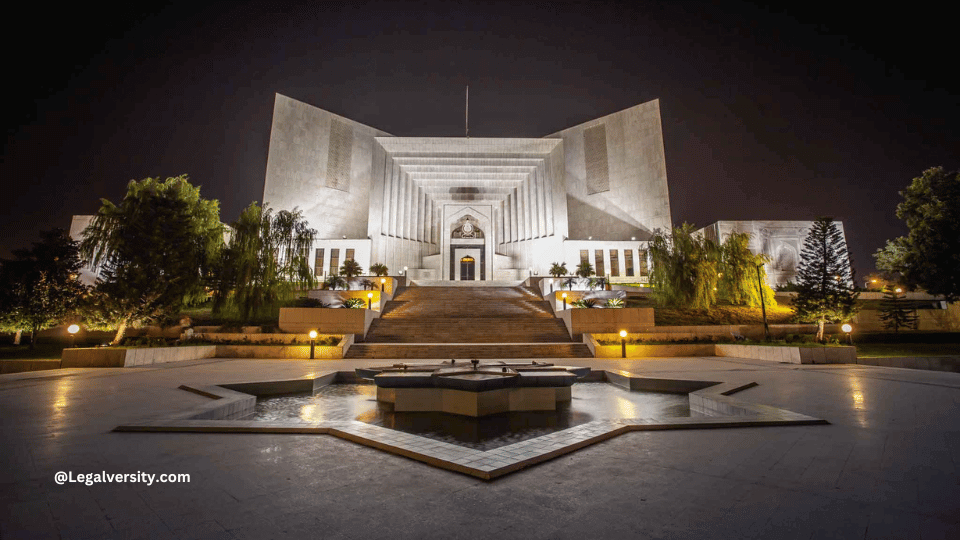On Wednesday, the Supreme Court decided to keep the Practice and Procedure Act in place. They did this by rejecting the petitions that wanted to change the law. The decision was made with most of the judges, 10 out of 15, agreeing to keep the law as it is.
A full court bench comprising 15 judges, head by Chief Justice of Pakistan (CJP) Qazi Faez Isa, pronounced the judgement that was reserved earlier in the day after five consecutive hearings. The law was deemed in accordance with the Constitution.
According to the verdict, the right to appeal will not apply retroactively. The clause seeking application of the right to appeal on past decisions has been voided with 8-7 majority, while the chief justice dissented from the decision.
The right to appeal in decisions of suo motu cases under Article 184(3) has been sustained with a 6-9 majority.
Justice Ijazul Ahsan, Justice Mazahar Naqvi, Justice Muneeb Akhtar, Justice Ayesha Malik were among the dissenters of the 10-5 verdict.
With this decision, the Supreme Court (Practice and Procedure) Act stands enforced.
What is Supreme Court (Practice and Procedure) Act 2023?
The Supreme Court (Practice and Procedure) Act 2023 is a controversial piece of legislation that was passed by the Parliament in April 2023.
The Act aims to address concerns about the chief justice of Pakistan’s authority, procedures, and discretionary powers, particularly in relation to suo moto proceedings and the composition of benches for hearing crucial constitutional issues.
Background
On April 10, 2023, the Parliament passed the Supreme Court (Practice and Procedure) Bill 2023.
This proposed law would establish a panel of the most senior judges, led by the chief justice of Pakistan, to handle and conclude all cases, appeals, and issues presented before the top court.
The bill was introduced by then-law minister Azam Nazeer Tarar.
On March 29, 2023, the National Assembly (NA) passed the legislation without referring it to the relevant standing committee.
This came one day after the Senate approved the bill.
President Arif Alvi returned the bill to Parliament twice, asking for further consideration.
However, on April 10, 2023, the bill was passed again with some modifications, amidst a noisy protest by Pakistan Tehreek-e-Insaf (PTI) lawmakers.
The passage of the act was prompted by a legal dispute between the previous government and the superior judiciary over important constitutional questions.
The government argued that the Supreme Court was overstepping its bounds and interfering in executive and legislative affairs.
The top court countered that it was simply exercising its constitutional powers to uphold the rule of law and protect the fundamental rights of citizens.
Key Provisions of Act
The act makes a number of significant changes to the way the Supreme Court operates. These include:
- Requiring a three-member committee of senior judges, including the CJP, to approve all suo moto notices.
- Establishing a transparent process for the formation of benches for hearing crucial constitutional issues.
- Giving parties the right to appeal to the Supreme Court within 30 days of a final order from a lower court.
- Requiring the apex court to hear applications alleging urgency or requesting interim relief within 14 days of filing.
Implications of the Act
The act has been met with mixed reactions from legal experts and civil society groups.
Some argue that it is a necessary step to streamline the judicial process and make the Supreme Court more accountable.
Others argue that it is an attempt to undermine the independence of the judiciary and give the government more control over the top court.
One of the main concerns about the act is that it gives the chief justice too much power.
The CJP would be responsible for appointing the other two judges to the committee, and the committee would have the final say on all suo moto notices. This means that the top judge would have a significant influence on the outcome of all cases heard by the Supreme Court.
Another concern is that the act would make it more difficult for ordinary citizens to access justice.
The act introduces a new requirement that all appeals to the Supreme Court must first be approved by a lower court.
This means that it would be more difficult for litigants to challenge decisions made by lower courts, even if those decisions are unfair or unjust.
Judgement of Supreme Court of Pakistan in Court Practice and Procedure Bill
For reasons to be recorded later these petitions are decoded as under:
1. Subject to paras 2 and 3 below, by a majority of 10 to 5 (Justice Ijaz Ul Ahsan, Justice Munib Akhtar, Justice Sayyed Mazahar Ali Akbar Naqvi, Justice Ayesha A. Malik and Justice Shahid Waheed dissenting the Supreme Court (Practice and Procedure) Act, 2023 is sustained as being in accordance with the Constitution of the Islamic, Republic of Pakistan (“the Constitution”) and to this extent the petitions are dismissed.
2. By a majority of 9 to 6 (Justice Ijaz ul Ahsan, Justice Munib Akhtar, Justice Yahya Afridi, Justice Sayyed Mazahar Ali Akbar Naqvi, Justice Ayesha A. Malik and Justice Shahid Waheed dissenting) sub-section (1) of section 5 of the Act (granting a right of appeal prospectively) is declared to be in accordance with the Constitution and to this extend the petitions are dismissed.
3. By a majority of 8 to 7 (Chief Justice Qazi Faez Isa, Justice Sardar Tariq Masood, Justice Syed Mansoor Ali Shah, Justice Amin-ud-Din, Justice Jamal Khan Mandokhail, Justice Athar Minallah and Justice Musarat Hilali dissenting) sub-section (2) of section 5 of the Act (granting a right of appeal retrospectively) is declared to the ultra vires the Constitution and to this extent the petitions are allowed.
Also Read:
- Supreme Court Case-Law Update (Oct-Dec 2020)
- Lahore High Court Annual Holidays Schedule 2023
- Different Jurisdictions of Courts in Pakistan

